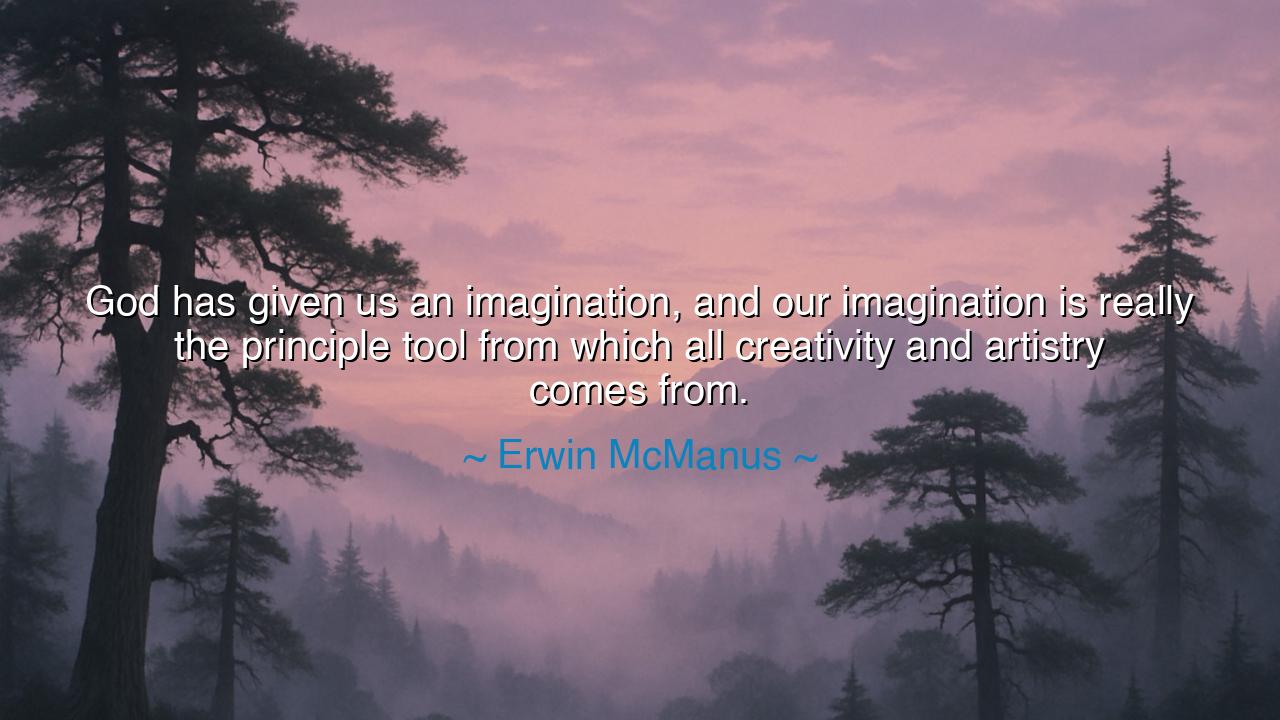
God has given us an imagination, and our imagination is really
God has given us an imagination, and our imagination is really the principle tool from which all creativity and artistry comes from.






The Divine Fire Within: On Imagination as the Gift of Creation
Listen, O child of the Eternal, to the words of Erwin McManus, the thinker and teacher of the modern age, who declared: “God has given us an imagination, and our imagination is really the principal tool from which all creativity and artistry comes.” In this saying lies a sacred revelation — that the imagination is not a mere human trick of fancy, nor a fleeting dream of the mind, but the very breath of divinity placed within the human soul. It is the echo of creation itself — the spark through which mortals may participate in the work of the divine.
From the beginning of time, the ancients understood this truth. When the world was yet young, they said that humankind was made in the image of its Creator — not in form, but in spirit. For just as the Eternal spoke light into the void, so too does humanity shape meaning from the unseen. When a poet dreams, when a painter creates, when a builder envisions a city where only dust lies, it is the same creative fire that first birthed the stars. To imagine is to act in likeness to God. It is not imitation; it is participation — a sacred partnership between the infinite and the finite.
McManus, who has spent his life speaking of faith and creativity, calls imagination the “principal tool” of artistry because it is through it that all form takes life. Skill, knowledge, discipline — these are noble servants, but imagination is the master that gives them direction. Without imagination, the sculptor sees only stone; with it, he perceives the angel sleeping within it. Without imagination, words are mere symbols; with it, they become prophecy. It is imagination that allows humankind to bridge heaven and earth — to see beyond what is, into what could be.
Consider the life of Michelangelo, that giant among artists, whose visions reshaped the ceilings and altars of the world. When asked how he created his statues, he said, “I saw the angel in the marble and carved until I set him free.” This is what McManus speaks of: the divine imagination that sees life where others see nothing. Michelangelo’s genius was not merely in his hands, but in his vision — that holy ability to perceive the invisible. Such imagination does not belong only to artists, but to every human being who dares to create, to love, to hope, to believe.
Yet, the teacher’s words carry also a challenge. For the imagination, though divine in origin, can wither in neglect. The world often trains us to see only what is visible, to value what can be measured. But the imagination, like a garden, grows only when tended. When one ceases to dream, to wonder, to envision goodness or beauty, the divine spark begins to dim. McManus reminds us that imagination must be cultivated — through reflection, through art, through awe. The artist prays through color; the philosopher prays through thought; the dreamer prays through vision. Each act of creation is an act of worship, an acknowledgment that we carry within us a piece of eternity.
In this way, creativity and faith are sisters. To create is to believe that something unseen can become real; to have faith is to trust in what is not yet visible. Every invention, every poem, every act of kindness springs first from imagination — from the inward vision of what could exist beyond the present. The scientist imagines a world cured of disease, the reformer imagines a society ruled by justice, the lover imagines peace in the hearts of humankind. In each of these acts, the divine purpose of imagination is fulfilled — it becomes the instrument of creation through which the world is renewed.
So, O bearer of this sacred fire, take this lesson into your heart: guard your imagination, for it is holy. Do not let cynicism extinguish it, nor let fear bind it. Feed it with beauty, with gratitude, with stories that lift the soul. Allow your imagination to wander through both wonder and suffering, for it is in seeing both that compassion and creation are born. And remember — your imagination is not merely your own. It is the reflection of the Creator’s mind within you, the eternal whisper that says, “Let there be light.”
Thus, as Erwin McManus teaches, the imagination is the first gift and the last hope of humankind. From it springs every act of artistry, every breath of inspiration, every spark of progress. It is through imagination that we transform chaos into meaning, despair into possibility, and the ordinary into the sacred. Therefore, live as a co-creator with the divine — shaping your world with imagination aflame, for in doing so, you fulfill the highest purpose of your existence: to make visible the invisible glory of the human spirit.






AAdministratorAdministrator
Welcome, honored guests. Please leave a comment, we will respond soon